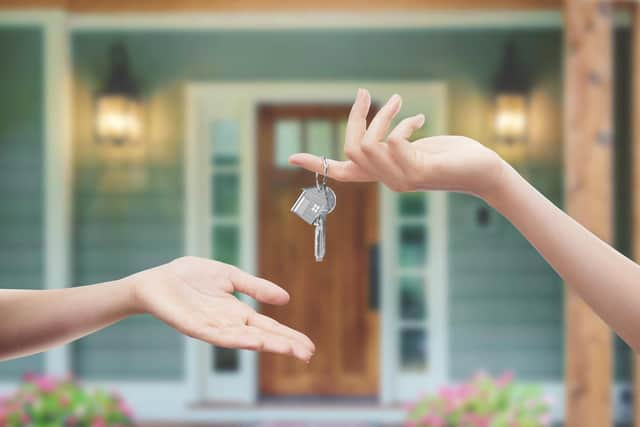Be aware of the main issues when buying a shared ownership home
The shared ownership model enables people to buy a share in a property, usually from a Housing Association and usually via a mortgage. The latter will typically be more expensive than a standard mortgage as lenders see shared ownership buyers as being higher risk when it comes to repayments.
The buyer then pays rent on the rest and has the option to up their share until they own the property outright. The latter is known as staircasing.
Advertisement
Hide AdAdvertisement
Hide AdTo qualify for a shared ownership home your household income should be £80,000 a year or less or £90,000 a year or less in London. Mortgages for shared ownership homes are typically more expensive than standard mortgages as lenders feel there is more risk.


You must also have a good credit history and not have any mortgage or rent arrears and in some but not all cases, you may have to show that you live in, work in, or have a connection to the area where you want to buy.
One of the following must also be true: you are a first-time buyer, you used to own a home but cannot afford to buy one now, you are forming a new household possibly due to a relationship breakdown, you own a home and want to move but cannot afford a new home that meets your needs.
If you’re aged 55 or over at the time of buying the home, you can buy up to a 75 per cent share through OPSO, the Older Persons Shared Ownership scheme. Once you own 75 per cent of the property, you will not pay rent on the rest.
Advertisement
Hide AdAdvertisement
Hide AdOn paper, shared ownership sounds like a good deal and it has helped many people onto the property ladder.
However, as the Select Committee agreed, this way of buying is not without issues. Its report points out that shared ownership can often become unaffordable over time as shared owners have to pay for 100 per cent of repair and maintenance costs despite only owning a proportion of the property.
This has had a particularly devastating effect on those who live in shared ownership homes affected by the cladding and building safety scandal. Indeed, a shared owner from Leeds was one of the first forced to declare herself bankrupt as a result of being unable to pay fire safety costs with no help from the housing association that co-owned her flat.
The End Our Cladding Scandal campaign group, says: “We agree fully with the Select Committee’s conclusion that shared ownership products can often become unaffordable over time.
Advertisement
Hide AdAdvertisement
Hide Ad“Shared owners have been sold an ‘affordable home’ as part of a flagship government-backed scheme managed by supposedly charitable housing providers.
"However, in practice, shared owners trapped in the building safety crisis face a triple whammy of above-inflation service charges and rent increases, an inability to remortgage, staircase or sell, and restrictive covenants that prevent them from covering costs when subletting their flat, when they are permitted to do so.
The EOCS adds: “Many shared owners are effectively prisoners in homes that no longer meet their needs and that they can no longer afford.
“We are pleased to see that the Committee included some of our recommendations, including asking the Government to take action to ensure housing providers are required to buy back shares from shared owners where they are trapped and unable to sell due to building remediation issues, but more has to be done.”
Advertisement
Hide AdAdvertisement
Hide AdThe EOCS stresses that the Committee report states that the Building Safety Act 2022 protects shared owners but there is no protection for shared owners in buildings under 11m.
An EOCS spokesperson adds: “Some housing associations have informed their shared owners they will not pass non-cladding costs to them, while others have said that they reserve the right to do so.
“There are additional challenges for shared owners in blocks where the housing association is not the freeholder. Protection from building safety costs is then a lottery.”
Secretary of State for Levelling Up, Housing and Communities Michael Gove recently allowed housing providers more flexibility in permitting shared owners to sublet and buy back shares, but this has yet to make a difference.
Advertisement
Hide AdAdvertisement
Hide AdThe EOCS team says: “We are contacted regularly by shared owners, including some about to lose their homes. We hope the report will force the Government, local government and housing providers to act.”
The government response to the report is due on May 28, 2024.